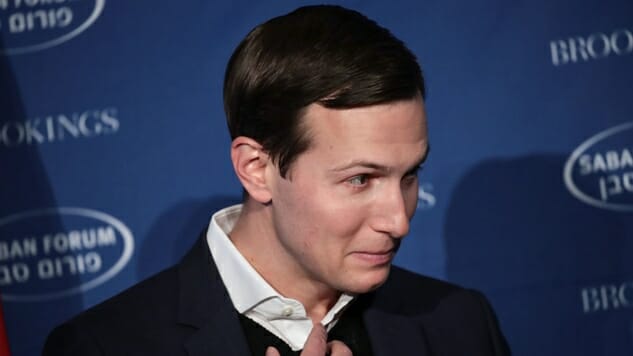5 Shady Deals That May Have Cost Jared Kushner His Top-Secret Security Clearance
Photo by Drew Angerer/Getty
Jared Kushner has been tasked to negotiate peace in the Middle East, solve the opioid crisis, streamline government operations and serve as something of a de facto Secretary of State in the Trump administration. It’s impossible for him to properly execute those duties now that he does not have a top-secret security clearance. Per Politico:
Presidential son-in-law and adviser Jared Kushner has had his security clearance downgraded — a move that will prevent him from viewing many of the sensitive documents to which he once had unfettered access.
Kushner is not alone. All White House aides working on the highest-level interim clearances — at the Top Secret/SCI-level — were informed in a memo sent Friday that their clearances would be downgraded to the Secret level, according to three people with knowledge of the situation.
This is just the tip of the iceberg of the problems plaguing the boy wonder, as The Washington Post reported soon after Politico’s story dropped last night:
Officials in at least four countries have privately discussed ways they can manipulate Jared Kushner, the president’s son-in-law and senior adviser, by taking advantage of his complex business arrangements, financial difficulties and lack of foreign policy experience, according to current and former U.S. officials familiar with intelligence reports on the matter.
Among those nations discussing ways to influence Kushner to their advantage were the United Arab Emirates, China, Israel and Mexico, the current and former officials said.
It is unclear if any of those countries acted on the discussions, but Kushner’s contacts with certain foreign government officials have raised concerns inside the White House and are a reason he has been unable to obtain a permanent security clearance, the officials said.
What we know about Kushner’s finances is murky at best, as highlighted by this Washington Post story that dove into his public financial disclosure report on Form 278e.
The companies, properties and other assets that Kushner still owns are worth between $167.5 million and $569.5 million. Kushner’s 54-page financial disclosure reveals little information about how — or why — he decided to keep certain holdings. It is not clear whether those personal business interests might benefit from his influential place in the White House.
Here are five other reasons why the intelligence community should have serious reservations about Jared Kushner’s access to the most sensitive information on the planet.
1. Qatar
Last summer, The Intercept uncovered an overture from Kushner to Qatari interests.
Not long before a major crisis ripped through the Middle East, pitting the United States and a bloc of Gulf countries against Qatar, Jared Kushner’s real estate company had unsuccessfully sought a critical half-billion-dollar investment from one of the richest and most influential men in the tiny nation, according to three well-placed sources with knowledge of the near transaction.
Qatar is facing an ongoing blockade led by Saudi Arabia and the United Arab Emirates and joined by Egypt and Bahrain, which President Trump has taken credit for sparking. Kushner, meanwhile, has reportedly played a key behind-the-scenes role in hardening the U.S. posture toward the embattled nation.
That hard line comes in the wake of the previously unreported half-billion-dollar deal that was never consummated. Throughout 2015 and 2016, Jared Kushner and his father, Charles, negotiated directly with a major investor in Qatar, Sheikh Hamad bin Jassim al-Thani, known as HBJ for short, in an effort to refinance the property on Fifth Avenue, the sources said.
2. Israel
Last month, the New York Times reported on an eight-figure deal between Kushner and an Israeli insurance giant.
Last May, Jared Kushner accompanied President Trump, his father-in-law, on the pair’s first diplomatic trip to Israel, part of Mr. Kushner’s White House assignment to achieve peace in the Middle East.
Shortly before, his family real estate company received a roughly $30 million investment from Menora Mivtachim, an insurer that is one of Israel’s largest financial institutions, according to a Menora executive.
The deal, which was not made public, pumped significant new equity into 10 Maryland apartment complexes controlled by Mr. Kushner’s firm. While Mr. Kushner has sold parts of his business since taking a White House job last year, he still has stakes in most of the family empire — including the apartment buildings in and around Baltimore.
3. Russia
A confirmed meeting between Kushner and the head of a bank that is, well, friendly to Vladimir Putin’s interests continues to raise questions to this very day. Per The Washington Post:
The White House and a Russian state-owned bank have very different explanations for why the bank’s chief executive and Jared Kushner held a secret meeting during the presidential transition in December.
The bank maintained this week that the session was held as part of a new business strategy and was conducted with Kushner in his role as the head of his family’s real estate business. The White House says the meeting was unrelated to business and was one of many diplomatic encounters the soon-to-be presidential adviser was holding ahead of Donald Trump’s inauguration.
The discrepancy has thrust Vnesheconombank, known for advancing the strategic interests of Russian President Vladimir Putin and for its role in a past U.S. espionage case, into the center of the controversy enveloping the White House. And it has highlighted the role played by the bank’s 48-year-old chief executive, Sergey Gorkov, a graduate of the academy of the Federal Security Service, or FSB, the domestic intelligence arm of the former Soviet KGB, who was appointed by Putin to the post less than a year before his encounter with Kushner.
4. China
Stop me if you’ve heard this before, but a meeting between Kushner and a wealthy international financier is under a great deal of scrutiny. Per CNBC:
On the night of Nov. 16, a group of executives gathered in a private dining room of the restaurant La Chine at the Waldorf Astoria hotel in Midtown Manhattan. The table was laden with Chinese delicacies and $2,100 bottles of Château Lafite Rothschild. At one end sat Wu Xiaohui, the chairman of the Waldorf’s owner, Anbang Insurance Group, a Chinese financial behemoth with estimated assets of $285 billion and an ownership structure shrouded in mystery. Close by sat Jared Kushner, a major New York real estate investor whose father-in-law, Donald J. Trump, had just been elected president of the United States.
It was a mutually auspicious moment.
Mr. Wu and Mr. Kushner — who is married to Mr. Trump’s daughter Ivanka and is one of his closest advisers — were nearing agreement on a joint venture in Manhattan: the redevelopment of 666 Fifth Avenue, the fading crown jewel of the Kushner family real-estate empire. Anbang, which has close ties to the Chinese state, has seen its aggressive efforts to buy up hotels in the United States slowed amid concerns raised by Obama administration officials who review foreign investments for national security risk.
Now, according to two people with knowledge of the get-together, Mr. Wu toasted Mr. Trump and declared his desire to meet the president-elect, whose ascension, he was sure, would be good for global business.
5. Manhattan

Photo by Stephen Chernin/Getty
If you’re wondering why Jared Kushner is so thirsty for hundreds of millions of dollars, this albatross at 666 (yes, really) Fifth Avenue is why. Jared Kushner isn’t qualified to be a White House intern, let alone something of a Secretary of State/Chief of Staff to the president. He has done two things in his life: run a newspaper into the ground (The Observer) and make one of the worst purchases in American real estate history while covering for his father who was sent to prison for 18 counts of illegal campaign contributions (*thinking face emoji*), tax evasion (*thinking face emoji*) and witness tampering. The latter came as a result of the elder Kushner hiring a prostitute to seduce his brother-in-law, arranging a meetup, then sending the tape to his sister. That’s why Jared Kushner got the opportunity to run Kushner Cos.
At the very peak of the real estate boom in 2006, Kushner Cos. purchased a 41-story skyscraper for a whopping $1.8 billion. Kushner financed the deal entirely with debt, save for $50 million. The company still owns half of a $1.2 billion mortgage that is due next year. They haven’t paid a dime on it. The adviser closest to the President of the United States has a nine-figure debt payment due next year on a property whose debt payments have exceeded net operating income every year except for 2012 and 2013. If you’re any foreign intelligence service not working Kushner over like a speed bag, you’re missing the boat on a historic opportunity to exploit a massive vulnerability within the world’s only hegemon.
Kushner’s plan to salvage this outdated building is to knock it to the ground and build an 80-story tower with expanded areas for retail and high-end condominiums. Bloomberg published an exhaustive report on the tower based on “a review of thousands of pages of financial documents and interviews with more than two dozen executives, business partners, real estate agents, deal participants and analysts,” and they pointed out the obvious flaw in this plan:
No short- or medium-term return can be expected from such an aggressive approach. Even a return over the long run would be speculative, though [Kushner Cos. President Laurent] Morali describes the plan as “ambitious and creative.” That narrows the pool of investors to those interested in something other than profit. Real estate experts say this almost certainly precludes U.S. companies. More likely: a foreign firm looking to get capital out of its country or seeking a trophy Manhattan property.
Bloomberg highlighted how Trump’s ascension to the presidency coincided with a rise in interest around Kushner’s tower of doom.
Before Trump began his rise to the presidency and the 36-year-old Kushner became his senior adviser, 666 Fifth Avenue struggled to attract serious offers. Meetings the Kushners requested were often rejected. After Trump’s nomination, billions of dollars in Asian and Middle Eastern money came under discussion. Two potential deals that made it to advanced stages, with China’sAnbang Insurance Group and a top Qatari sheikh, fell apart.
Like father, like son-in-law: the scion of a New York real estate empire may not actually own the assets with his name on it.
But after selling 18,000 mid-Atlantic apartments in 2007, the Kushners only partially own a substantial number of the company’s assets. In many cases, Kushner Cos. has partnered with well-capitalized firms that want to invest in real estate and seek out experienced locals for deals. These include the Israeli firm Gaia Investment Corp. as well as Oaktree Capital Management, the Los Angeles-based asset manager, and Stonehage Fleming, a London firm that invests money on behalf of 250 wealthy families primarily from Europe, the Middle East, and Africa.
Vornado—a real estate giant that reported $2 billion in revenue last year—owns almost half the building’s offices and most of the stores thanks to a 2011 refinancing by Kushner Cos. Steve Roth—Vornado’s chairman and chief executive officer—said in a 2014 meeting with Jared Kushner and his father Charles that 666 Fifth Avenue “would be worth a lot more if it was just dirt.”
ah, yes, Kushner has vast and sprawling financial interests that, paired with his obvious ignorance, leave him acutely vulnerable to manipulation
oh well, at least no one senior to Kushner in the WH has a similar slate of problems
— Simon Maloy (@SimonMaloy) February 27, 2018
This investment is such a titanic calamity that it almost certainly was a central reason why Jared Kushner lost his top-level security clearance. Given Robert Mueller’s interest in the president’s son-in-law, it’s difficult to see how John Kelly could return Kushner’s security clearance to him. The good news for Kushner is that he doesn’t need a security clearance to call up his father-in-law, and there is nothing stopping President Trump from telling anyone whatever classified intelligence he wants (Trump could also unilaterally reinstate Kushner’s top-secret clearance, but he has publicly said he will leave that decision up to Kelly, who just rescinded it). When it comes to shady real estate investments, Trump and Kushner are partners in crime figuratively, but the more we learn about their distressed empires, the more literal that phrase seems.
UPDATE: Just before this piece went up, Reuters broke the news that Kushner’s dealings with Deutsche Bank and “two other lenders for information on their relationships with White House senior adviser Jared Kushner, his family’s real estate company and family members” are being scrutinized by the New York state banking regulator.
Jacob Weindling is a staff writer for Paste politics. Follow him on Twitter at @Jakeweindling.







































